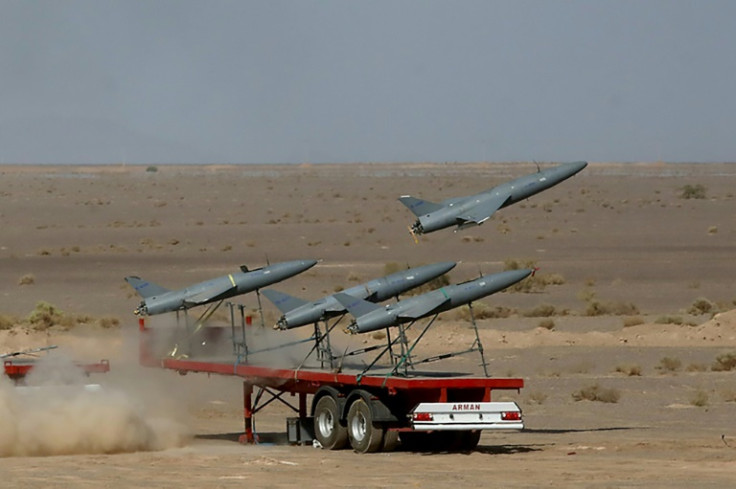Iran To Limit Range Of Drones, Missiles Sent To Russia Fearing Global Sanctions 'Snap-back'
KEY POINTS
- Iran nuclear deal contains the so-called 'snap-back' procedure which could revive sanctions against Tehran
- Washington has accused Moscow of providing advanced military assistance to Iran
- U.S. officials believe that Iran is seeking Moscow's help to bolster its nuclear program
Iran is reportedly planning to limit the range of its drones and missiles sent to Russia, fearing the reimposition of global sanctions. However, Tehran will continue sending missiles to Moscow, modifying them to a range of less than 300 km (186 miles).
Tehran wants to limit the range of the missiles it plans to provide Moscow for the war in Ukraine, Axios reported, citing four unnamed senior Israeli officials.
The UN Security Council resolution 2231, passed as part of the Iran nuclear deal, imposes restrictions on countries dealing with Tehran's ballistic missiles and drone programs that have a range over 300 km and a payload higher than 500 kilograms (1102 lbs). Passed in July 2015, the restrictions imposed under the resolution are in force until October 2023.
As per the Axios report, the missile under consideration is the Fateh-110 missile system which has a range of about 300 km, which Tehran plans to modify to ensure it does not overstep the UN resolution.
According to Israeli officials cited in the report, Iranians had earlier considered supplying Russia with the Zolfaghar missile having a range of 700 km but eventually decided against it.
The Washington Post, citing an intelligence assessment, had on Oct. 16 reported that Iran's armaments industry was readying its first shipment of Fateh-110 and Zolfaghar missiles bound for Russia.
Influencing Tehran's decision to limit the range of its missiles is the nuclear accord between Iran and the P5+1 — which includes five permanent members of the UN Security Council along with Germany. The deal contains the so-called "snap-back" procedure, which could revive all U.N. sanctions against Tehran for breaching the deal.
In May 2018, when the U.S. announced its unilateral withdrawal from the nuclear deal and called for the application of the snap-back procedure, Washington was largely left isolated. Now Iran has been demanding the removal of the snap-back clause in the nuclear accord in new talks with world powers.
Tehran fears that violating these restrictions by supplying longer-range missiles and drones to Russia would lead to the reimposition of UN sanctions, the outlet reported. Such a situation would be not only problematic for Tehran but also for Moscow, which is a permanent member of the Security Council, and part of the deal.
Despite Western intelligence reports indicating otherwise, Tehran has repeatedly denied supplying Moscow with drones and missiles. However, Iranian Foreign Minister Hossein Amir-Abdollahian did admit on Nov. 5 that Tehran provided drones to Moscow, although claiming that they were sent months before the Ukrainian war. Reports say Russia repainted these Iranian drones and gave them Russian names to hide their origin.
In an effort to boost defense cooperation between the two countries, a Russian military delegation led by the deputy defense minister, Alexander Fomin, visited Tehran on Dec. 3 and held talks with Maj. Gen. Mohammad Hossein Bagheri, the chief of staff of Iran's Armed Forces.
While the UN Security Council will convene on Dec. 19 to discuss the implementation of resolution 2231, this growing defense cooperation between Russia and Iran is particularly alarming for the U.S. and its allies.
Washington has accused Moscow of providing advanced military assistance to Tehran, including air defense systems, helicopters and fighter jets, in return for Iranian weapons. Officials in the U.S. also believe that Iran is seeking Russia's help to bolster its nuclear program.
Meanwhile, Israel is reportedly worried that given their growing cooperation, Russia could provide Iran with engines for its long-range missiles. Jerusalem is also concerned that Moscow will offer Tehran greater freedom to operate in Syria to attack Israel and the U.S. forces in the region.

© Copyright IBTimes 2024. All rights reserved.






















